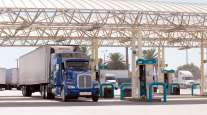Staff Reporter
Illinois Bill to Copy California Emission Regs Draws Heat

[Stay on top of transportation news: Get TTNews in your inbox.]
A wave of opposition is mounting in the Illinois General Assembly to a bill that would have the state follow California’s lead in adoption of strict emissions laws that would eventually prohibit sales of diesel-powered trucks in favor of zero-emission options such as electric vehicles.
In particular, the bill would amend the Illinois Vehicle Emissions Inspection Law of 2005 to allow the state’s Environmental Protection Agency to adopt rules that mirror California’s motor vehicle emission standards. The bill specifically proposes to adopt four California programs for zero-emission vehicles, low-emission vehicles, advanced clean trucks and heavy-duty low nitrogen oxide limits.
The U.S. Environmental Protection Agency in 2023 granted the California Air Resources Board permission to adopt regulations that require manufacturers to produce and sell increasing quantities of medium- and heavy-duty zero-emission trucks in the state. Some states, like Illinois, aim to follow suit.
As of Feb. 21, 3,745 opponents had filed so-called witness slips in Illinois’ 103rd General Assembly against the legislation — officially known as House Bill 1634 — compared with 539 backers.
Matt Hart, executive director of the Illinois Trucking Association, told Transport Topics the outpouring of dissent “is the largest number of people I have ever seen who filed a witness slip in opposition to a trucking-related bill.”
HB 1634 Coalition Position Paper 02 19 2024
Backed by three Democrats, the bill was introduced by Rep. Edgar Gonzalez Jr. Rep. Janet Yang Rohr became a co-sponsor Feb. 7 and nine days later Rep. Bob Morgan was added to the bill.
If enacted, the legislation would permit Illinois to amend its emissions rules within six months “to maintain consistency with the California motor vehicle emission standards and federal clean air laws.”
California has been aggressively targeting transportation emissions. In addition to moving to gradually outlaw the sale of diesel-powered vehicles in stages, it also aims to penalize warehouses it deems responsible for emissions output of delivery vehicles, and require out-of-state companies to report emissions for delivery of goods into the state. California said it would fine carriers that do not comply.

Hart
Hart said such a law is “not only a detriment to the trucking industry, but it would be a killer for businesses in Illinois” since the state must compete for business with nearby ones, especially Indiana, Wisconsin, Missouri, Iowa and Kentucky.
Opponents of the bill include the Chicagoland Chamber of Commerce, the Illinois Manufacturers’ Association and the National Federation of Independent Businesses Inc.
“Trucking, transportation, warehousing is the number one business for minority business ownership in Illinois,” Hart said. “Most of these are small businesses that cannot afford a $480,000 electric truck. They’ll simply move. They’ll start a company in Indiana or Wisconsin where they can afford to buy a clean diesel truck.”
ITA said the legislation would result in more congestion since 34% more zero-emission trucks would be required to deliver the same amount of goods as today’s traditional trucks. “The cost to operate an electric truck is nearly double the cost to operate a traditional truck. Higher transportation costs mean higher costs for consumers,” the group said.
Furthermore, it contended that heavy-duty electric trucks are more than 50% heavier than their diesel-powered equivalents, which would further strain aging roads and bridges. Also a new electric semitruck costs upwards of $480,000 compared with $180,000 to $200,999 for a new diesel truck. Electric trucks also require electric chargers that can cost about $112,000, ITA said.
Hart is encouraging truckers in Illinois and those whose commercial vehicles pass through the state to contact Illinois lawmakers and its governor to share their views on the proposed new law.
Want more news? Listen to today's daily briefing above or go here for more info
Numerous Illinois trucking companies already have weighed in with their formal opposition to the legislation.
Hart said the next step for the legislation, which has a companion bill in the Senate, may be a subject matter hearing, which he favors.
“We do think it’s good to talk about the environment. We’re very proud of the fact that we’ve reduced emissions by 98% over the last three decades and we want legislators to know the work that we have done in the trucking industry,” he said. “Also we need to educate lawmakers that these solutions that the environmentalists are proposing are not a good fit, are not realistic and certainly not realistic for a state like Illinois,” he added.




